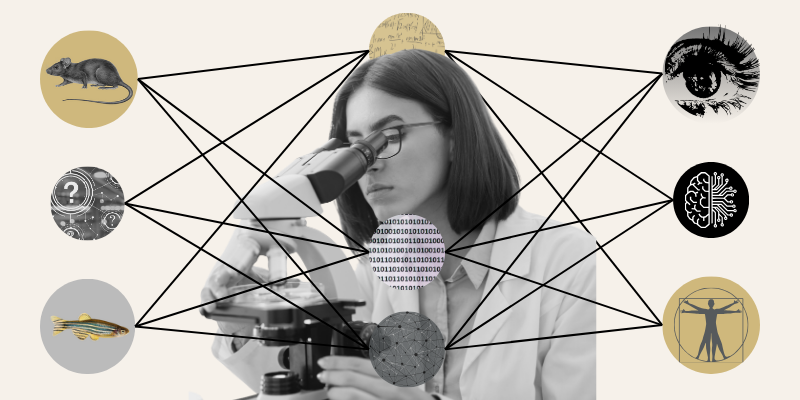As the brisk winter air howled outside, a group of eager individuals gathered inside the cozy downstairs space of Tattered Cover Bookstore on Colfax. These attendees had come together with a shared purpose: to deepen their understanding of one of the body's most essential yet often overlooked systems—the gut.
Catherine Lozupone, PhD, professor of biomedical informatics, and her trainee, Brook Santangelo, a student in the Computational Bioscience Graduate Program at the University of Colorado Anschutz Medical Campus, took their place at the front of the room, ready to lead the discussion on the critical role of the intestinal microbiome in health.
Gut check: How different factors impact microbiome health
Santangelo began by discussing the various factors that influence the gut, culture, age, and disease, to name a few. She shared, "Western diets, especially those high in carbohydrates, fats, and proteins, are associated with an increase in autoimmune and inflammatory conditions. In contrast, rural cultures that follow fiber-rich diets tend to have microbiomes that differ significantly from those found in Western populations." Santangelo also highlighted other key factors, stating, "Age plays an important role, as the infant microbiome is still developing and is heavily shaped by the mother’s microbiome. This makes early-life consistency essential for healthy development." She continued, "Furthermore, the microbiome has been linked to a variety of diseases, including inflammatory bowel disease and even conditions like Parkinson’s disease."
This raises an important question: can modifying our diets help manage and improve microbiome health for better overall health outcomes?
Crafting diets based on your microbiome
Lozupone began her portion of the talk by sharing a study conducted by Justin Sonnenburg and his team at Stanford, which explored how different diets affect the microbiome and immune responses. She explained that during the study, participants were randomly assigned to either a high-fiber diet, rich in fruits and vegetables, or a diet high in fermented foods, like kimchi and kombucha, which contain microbes that ferment food outside the gut. The study found that the high-fiber diet did not significantly alter the microbiome over the eight-week period, although some functions improved. The impact on inflammation varied depending on participants' baseline microbiomes: those with a microbiome with a high diversity of different types of microbes saw reduced inflammation, while those with a less diverse microbiome experienced an increase in inflammation.
Sonnenburg’s findings underscored the importance of personalized medicine, where dietary recommendations can be tailored to an individual's unique gut microbiome.
Improved health through diet for individuals living with HIV
Lozupone, who has studied the gut microbiomes of people living with HIV for more than a decade, noted, “We discovered that their microbiomes often resembled those found in people from agrarian cultures, even though their diets were not similar." She added, "This led us to wonder if people with HIV adopted a diet more similar to those in agrarian cultures, could it improve their health?”
To explore this, Lozupone and her team randomized people with HIV to follow either an agrarian-type diet (low in fat, high in fiber) or a typical Western diet. After four weeks, those on the agrarian diet showed significant drops in inflammation, immune activation, and improved low-density lipoprotein (LDL) cholesterol levels. However, Lozupone said that the degree of improvement in LDL cholesterol varied among participants, with those starting with a microbiome with a greater resemblance to those of people in agrarian cultures showing the most significant benefits. This suggests that the effects of diet may depend on an individual's gut health.
While this study was promising, it also highlighted the complexity of microbiome health. Lozupone emphasized, “It would be great to say that everyone should simply eat more fruits and vegetables, but it’s clear that the best diet for an individual depends on their unique microbiome.” She added, “This is something we’re beginning to explore in labs like mine, but translating these findings into practical dietary recommendations is still a work in progress.”
Probiotics and Prebiotics: Do they really help restore gut health?
The Lozupone Lab is actively translating research into real-world solutions, addressing gut health directly at the bedside. Lozupone discussed the role of Clostridioides difficile (C. diff), a major cause of hospital-acquired diarrhea, particularly after antibiotic use. She explained, “C. diff infections occur when the healthy balance of gut bacteria is disrupted, as certain bacteria produce metabolites that suppress the pathogen.” Using an animal model of antibiotic-associated C. diff infection, her lab has found that animal models on a normal diet recover well from C. diff infections. In contrast, those on a highly processed Western diet, rich in fat and low in fiber, struggle to recover and are more likely to succumb to infection.
Some people try to counteract the side effects of antibiotics with probiotics. However, this may not be as effective as they expect. Lozupone shared, “While they are often recommended to restore gut health, they may not always be effective.” She explained that some probiotics, such as Lactobacillus, are not necessarily part of a healthy, diverse microbiome and may not restore balance after antibiotics.
In addition to probiotics, Lozupone’s team has explored using prebiotics—such as inulin (found in fiber bars), pectin (from fruits like apples), hemi-cellulose (like psyllium husk), and resistant starch (from potatoes)—to support recovery. She shared, “Although these prebiotics don’t fully restore gut health, they improve survival rates and provide some protection of antibiotic-induced microbiome disturbance in our C. diff animal model. This suggests that while prebiotic supplements can provide some benefit, they shouldn’t replace whole foods like vegetables, though they may be useful for individuals who can't tolerate a full diet, such as cancer patients who suffer from C. diff.”
Lozupone also cited a 2018 study showing that probiotics taken after antibiotics delayed recovery compared to other methods, like fecal microbiota transplantation (FMT). She emphasized that probiotics may be helpful in certain situations but are not a one-size-fits-all solution.
Using microbiome data to develop targeted therapies
Santangelo’s dissertation work has focused on integrating knowledge from the literature and public databases, such as the Human Microbiome Project and MetaHIT data, which involve sequencing large populations. The goal is to standardize and harmonize this data, allowing for systematic exploration. “This approach helps us make mechanistic hypotheses about how specific microbes or communities of microbes in the gut can influence disease or health,” Santangelo explained. Ultimately, her work aims to leverage the power of the microbiome to develop more targeted and effective therapies for a variety of diseases.
The science of microbiome health is complex, and while much has been learned, there is still much to uncover. Personalized nutrition based on an individual’s microbiome holds great promise for improving health outcomes, and early examples of this are already emerging. However, continued exploration is necessary to determine the best ways to support gut health and tailor treatments to each person’s unique needs.




.png)
